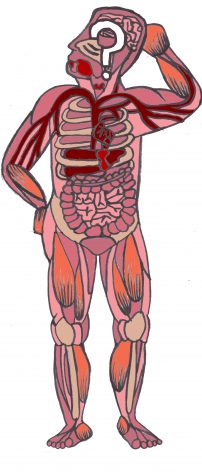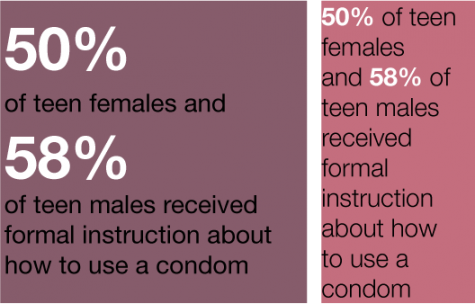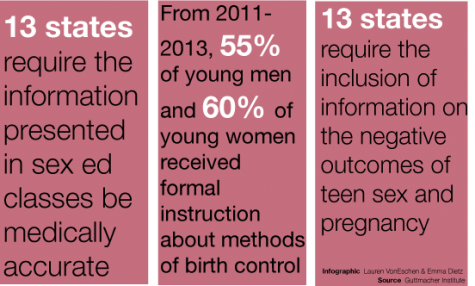Let’s talk about sex education
The good, the bad and what could change in Minnesota’s curriculum
May 20, 2016
 When sophomore Jake Henry, who is on the myHealth youth advisory board, realized health was only 15 days a year, he felt necessary topics like sexual education couldn’t be covered well in the short timeframe.
When sophomore Jake Henry, who is on the myHealth youth advisory board, realized health was only 15 days a year, he felt necessary topics like sexual education couldn’t be covered well in the short timeframe.
“We only had one week during freshman year where we talked about sex, but besides that we haven’t talked about it since,” Henry said.
Senior and Sexual Health Education Club (SHEC) president Dorothy Slater said she believes sexual education needs to be discussed more.
“I’ve learned that it’s something you need to talk about and be aware of,” Slater said. “You have to talk about it and acknowledge it because it’s important.”
Health teacher Allison Luskey said she thinks sex education is an important topic the curriculum should not overlook.
“It’s really hard to get through all the topics,” Luskey said. “I would say more time would be most beneficial.”
Slater said Park’s sex ed helps educate students, but a lot of topics aren’t able to get covered in the short amount of time that students get in health.
“It’s a lot better than other schools,” Slater said. “I also think there’s not really enough of it.”
According to Henry, he would also like to see a more inclusive sexual education program at Park.
“I think there is a lot more to learn besides just how to put on a condom,” Henry said. “People should know sex technology is still developing, like contraceptive technology, pills and stuff like that, as well as the politics of sex, such as how sex is discussed in other states and countries.”
Luskey said she agrees with Henry’s curriculum expansion points.
“I would say that the most important thing is that it is comprehensive,” Luskey said. “We should also be teaching about sexual orientation and gender identity as well, all those things, and individuality.”
What’s next?
According to education manager Jennifer Poole-Stout, the myHealth clinic in Hopkins provides services for young people aged 12-23 for medical reasons regarding their sexual activity.
“Our mission here at myHealth is to improve the health of our community by providing health services and information to teens and young adults in making responsible and well informed decisions,” Poole-Stout said. “Our vision is that one day all young people will be educated and empowered to make responsible decisions regarding their health and relationships.”
Junior Dayjah Mastin said she believes that health clinics are beneficial because they don’t involve the parents when they discuss sexual health and they provide teens with things they need to stay safe.
“At the health clinic I go to, they give out free birt h control,” Mastin said. “Doctors have to tell your parents, but for sexual health they don’t have to tell your parents.”
h control,” Mastin said. “Doctors have to tell your parents, but for sexual health they don’t have to tell your parents.”
Poole-Stout said she is the community education manager at myHealth and is responsible for overseeing community education programs.
“One of our traditions is education so each year we see over 15,000 teens and young adults, parents and professionals and provide education to the community,” Poole-Stout said.
Poole-Stout said she thinks the more inclusive information provided to young people, the better.
“We can provide more fact based information for our young people to make their decisions based off of,” Poole-Stout said.
Poole-Stout said she believes the sexual health curriculum could be improved by creating a set of general rules ensuring comprehensive education.
“When we’re thinking about sexual health education any time, there can be some sort of standardized guidelines in order to ensure education is comprehensive,” Poole-Stout said.
Poole-Stout also said an ideal sexual education program would have interactive activities and provide fact-based information.
“The more hands-on activities the better,” Poole-Stout said. “What is most important is to ensure young people have the skills to utilize that information.”
Poole-Stout said she finds it important for conversations to happen in the home regardinging sexual education.
“We always encourage families to be talking to their young person about any sexual health care topics,” Poole-Stout said. “We hope those conversations are happening so families are able to share their own values and beliefs and information with their young person.”
In order to create a more inclusive comprehensive sexual education, Luskey said she finds it important that parent’s and student’s voices and opinions are recognized and acknowledged.
“Whenever I hear feedback from students or parents I take it very seriously and try to do my best to take their ideas or con cerns or feedback and improve the curriculum,” Luskey said.
cerns or feedback and improve the curriculum,” Luskey said.
“I would say to anyone who is concerned or has questions, just speak up. That’s how we start to make improvements and that one can help, can make a difference,” she said.
Slater said SHEC is more beneficial in some ways compared to health classes because it is student-run, which helps students speak their minds and ask more questions.
“Having an environment that’s not teacher led and a huge group of classmates is really beneficial because people tend to feel more comfortable about asking questions and just to have that base group to go off of and other students you know you can ask questions is really helpful for other students,” she said.